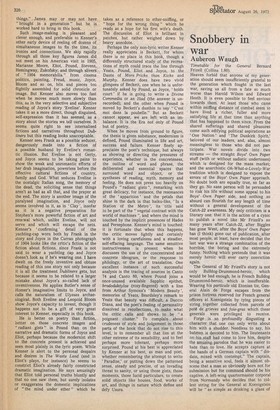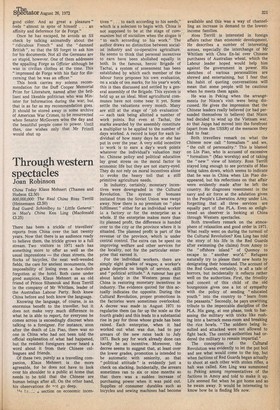Snobbery in war
Auberon Waugh
Timetable for the General Bernard Frizell (Collins 1.80).
Heaven forbid that anyone of my generation should seem insufficiently grateful to the generation which fought in the last war, saving us all from a fate so much worse than Harold Wilson and Edward Heath It is even possible to feel envious towards them. At least those who came within sniffing distance of combat seem to have lived a richer, fuller and more satisfying life at that time than anything that has happened to them since. From the shared sufferings and shared pleasures come such edifying political aspirations as 'One Nation' and 'The Dunkirk Spirit,' beloved of our leaders, and, alas, almost meaningless to those who did not participate. War novels divide into two streams — the straight Boys' Own Paper stuff (with or without sadistic undertones) which is designed for the mass market; and the anarchistic Oh-What-a-Lovely-War tradition which is designed to expose the errors of the Boys' Own Paper approach. No doubt both are equally true, so far as they go. No sane person will be persuaded to risk his life without some appeal to his Boys', Own Paper side, and nothing so absurd can flourish for any length of time without a general development of the Catch-22 awareness. My only criticism is a literary one: that it is the action of a cynic to publish a novel like Mr Frizell's so many years after Catch-22, after Biggles has gone West, after the Boys' Own Paper has (I think) gone out of publication, after most people, at least, have decided that the last war was a strange combination of the horrible, the boring and the extremely funny. Nothing which pretends that it was merely heroic will ever carry conviction again.
The General of Mr Frizell's story is not only Bulldog-Drummond-heroic, which would be bad enough, he is French Bulldog Drummond-heroic, which is insufferable. Wearing his particule old Etonian tie, General Alain de Forge escapes from the prison fortress reserved for French general officers at Kcienigstein by tying pieces of string together collected from parcels of pate de grieves and foie-gras which these generals were privileged to receive.
Forge is so profoundly disgusting a character that one can only write about him with a shudder. Needless to say, his batman is devoted to him. The lieutenants on his staff had come to love him, despite the amusing parodox that he was easier to hate than to love. He accepts capture at the hands of a German captain with "disdain, mixed with contempt." The captain, being a sensitive soul, feels it almost obscene that a man so obviously born not for submission but for command should be his captive. A left-wing quartermaster corporal from Normandy who decides that to collest string for the General at Koenigstein will be " as simple as drinking a glass of good cider. And as great a pleasure" feels "almost in spite of himself . . an affinity and deference for de Forge."
Once he has escaped, he avoids an SS check by talking animatedly about the "ridiculous French" and the "damned British ", so that the SS forget to ask him for his documents. Not all the Germans are so stupid, however. One of them addresses the appalling Forge as Offizier although he was in civilian clothes at the time. This "impressed de Forge with his flair for discerning that he was an officer."
This book carries my solemn recommendation for the Duff Cooper Memorial Prize for Literature, named after the brilliant and likeable politician who was Minister for Information during the war; but that is as far as my recommendation goes. It should be stored away in some archive of American War Crimes, to be resurrected when Senator McGovern wins the day and the beautiful people come to power. Until then, one wishes only that Mr Frizell would shut up











































 Previous page
Previous page